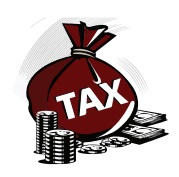Economics - Tax, Tax system | 10th Social Science : Economics : Chapter 4 : Government and Taxes
Chapter: 10th Social Science : Economics : Chapter 4 : Government and Taxes
Tax, Tax system
Tax
The origin of the word "tax" is from "taxation," which means an estimate.
Taxation is a Means by which governments finance their expenditure by imposing charges on citizens and corporate entities. The main purpose of taxation is to accumulate funds for the functioning of the government machinery. Tax has come into forefront on account of the new concept of “welfare state”.

Taxes are compulsory payments to government without expectation of direct return (or) benefit to the tax payer. Prof. Seligman also defined a tax as “a compulsory contribution from a person to the government to defray the expenses incurred in the common interest of all, without reference to special benefits conferred.”
Tax system
Every type of tax has some advantages and some disadvantages. So we have a tax system, that is, a collection of variety of taxes. From Adam Smith, many economists have given lists of canons of taxation. It is important to recall those common among them for discussion here.
1. Canon of equity
Since tax is a compulsory payment, all economists agree that equity is the cardinal principle in designing the tax system. The rich should pay more tax revenue to government than the poor, because rich has more ability than the poor to pay the tax.
2. Canon of Certainty
Government should announce in advance the tax system so that every tax payer will be able to calculate how much tax amount one may have to pay during a year to the government.
3. Canons of Economy and Convenience
If the tax is simple, then the cost of collecting taxes (tax payer cost + tax collector cost) will be very low. Further, tax should be collected from a person at the time he gets enough money to pay the tax. This is called canon of convenience. A convenient tax reduces the cost of collecting tax.
4. Canons of Productivity and Elasticity
Government should choose the taxes that can get enough tax revenue to it. It should choose a few taxes that can fetch more tax revenue, instead of lots of taxes. This is canon of productivity. Tax is paid by the people out their incomes. Therefore the tax system should be designed in such a way that the people automatically pay more tax revenue if their incomes grow. This is called canon of elasticity.
Why Taxes?
States and their functional equivalents throughout history have used money provided by taxation to carry out many functions. Some of these include expenditures on economic infrastructure (transportation, sanitation, public safety, education, healthcare systems, to name a few), military, scientific research, culture and the arts, public works and public insurance and the operation of government itself. A government's ability to raise taxes is called its fiscal capacity.
When expenditures exceed tax revenue, a government accumulates debt. A portion of taxes may be used to service past debts. Governments also use taxes to fund welfare and public services. These services can include education systems, pensions for the elderly, unemployment benefits and public transportation. Energy, water and waste management systems are also common public utilities.
Taxation in India has its roots from the period of Manu Smriti and Arthasastra. The present Indian tax system is based on this ancient tax system.
Related Topics